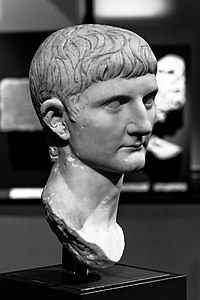Germanicus
| Germanicus Julius Caesar | |
|---|---|

Bust of Germanicus
|
|
| Born | 24 May 15 BC Rome, Italia, Roman Empire |
| Died | 10 October AD 19 (aged 33) Antioch, Syria, Roman Empire |
| Burial | Mausoleum of Augustus |
| Spouse | Agrippina the Elder |
| Issue |
Nero Julius Caesar Drusus Caesar Caligula, Emperor of Rome Agrippina the Younger, Empress of Rome Julia Drusilla Julia Livilla |
| Father |
|
| Mother | Antonia Minor |
Germanicus (24 May 15 BC – 10 October AD 19) was a member of the Julio-Claudian dynasty and a prominent general of the early Roman Empire. He was born in Rome, Italia, to Nero Claudius Drusus and his wife Antonia Minor. His original name at birth was either Nero Claudius Drusus after his father, or Tiberius Claudius Nero after his uncle, the second Roman emperor Tiberius. The agnomen Germanicus was added to his full name in 9 BC when it was posthumously awarded to his father in honour of his victories in Germania. By AD 4 he was adopted as Tiberius' son and heir. As a result, Germanicus was adopted out of the Claudii and into the Julii. In accordance with Roman naming conventions, he adopted the name Germanicus Julius Caesar.
In addition to Germanicus' relation to Tiberius, he was also a close relative to the other four Julio-Claudian emperors. On his mother's side Germanicus was a great-nephew of Augustus, the first emperor of Rome. By marrying his maternal second cousin, Agrippina the Elder, he became Augustus' grandson-in-law. Gaius (also known as Caligula), the emperor who succeeded Tiberius, was the son of Germanicus. After Caligula the emperorship passed to Claudius, Germanicus' younger brother. Nero, the last emperor of Augustus' dynasty, was a grandson of Germanicus on the side of his mother, Agrippina the Younger.
Germanicus' own campaigns in Germania made him famous after avenging the defeat at the Battle of the Teutoburg Forest and retrieving two of the three legionary eagles that had been lost during the battle. Beloved by the people, he was widely considered to be the perfect Roman long after his death. The Roman people for centuries would consider him as Rome's Alexander the Great due to the nature of his death at a young age, his virtuous character, his dashing physique and his military renown.
...
Wikipedia
